Skincare
How To Tailor Your Skincare For WINTER
From swapping your foam cleanser to an oil-based one to introducing moisture boosting hyaluronic acid into your routine, read on for an expert’s ultimate guide on how to winter-proof your skin.

From swapping your foam cleanser to an oil-based one to introducing moisture boosting hyaluronic acid into your routine, read on for an expert’s ultimate guide on how to winter-proof your skin.
As we head into December and the temperatures start to plummet and the central heating is turned up there is no escaping the harsh reality that winter is officially here. And whilst you have probably been preparing for this inevitable change in our weather, with purchases of new winter coats, sensible, sturdy boots and unearthing woolly hats and gloves from wherever they were buried last spring have you considered making adjustments to your skincare?
“Cold, dry and windy weather with little humidity leaves our facial skin in particular exposed to the elements. This can make the skin feel dry, sensitive and irritated. Says Dr Anjali Mahto consultant dermatologist at Skin55, a dermatology centre on Harley Street.
“This is compounded by the fact that we put on the central heating which dries the skin out further as well as hot baths and showers which will strip moisture from the skin. Experiencing seasonal changes with our skin is extremely common and environmental factors will affect all skin types regardless of colour.”
If you haven’t started thinking about or don’t know how to transition your skincare routine to a winter regime then follow Dr Anjali Mahto’s step by step guide on how to tailor your skincare routine and winter-proof your skin.

“When choosing a cleanser, it is more important to ascertain whether your skin is oily, dry or sensitive rather than purely making a choice based on the seasons. You need to get into the habit of assessing your skin – does it feel dry or tight after washing? Is it acne or blemish prone? Is it sensitive and prone to burning or sting on application of personal care products?
Oily skin types generally benefit from foaming cleansers with ingredients such as salicylic acid, zinc, niacinamide, benzoyl peroxide and sulphur. Those with more dry or sensitive skin may want to ditch the foaming cleanser and use a cream or oil-based cleanser instead which is less likely to dry the skin out.” Advises Mahto.
REN’s Evercalm Gentle Cleansing Milk is a calming milk that gently removes dirt and make-up whilst the omega oils nourish and protect skin; CeraVe’s Hydrating Facial Cleanser is packed with 3 types of ceramides and hyaluronic acid which work together to maintain the skin’s barrier and help to lock in moisture; Tata Harper’s Nourishing Oil Cleanser, is a gentle formula infused with vitamins A, C, E, and effortlessly dissolves and removes make-up and is ideal for those with dry skin.
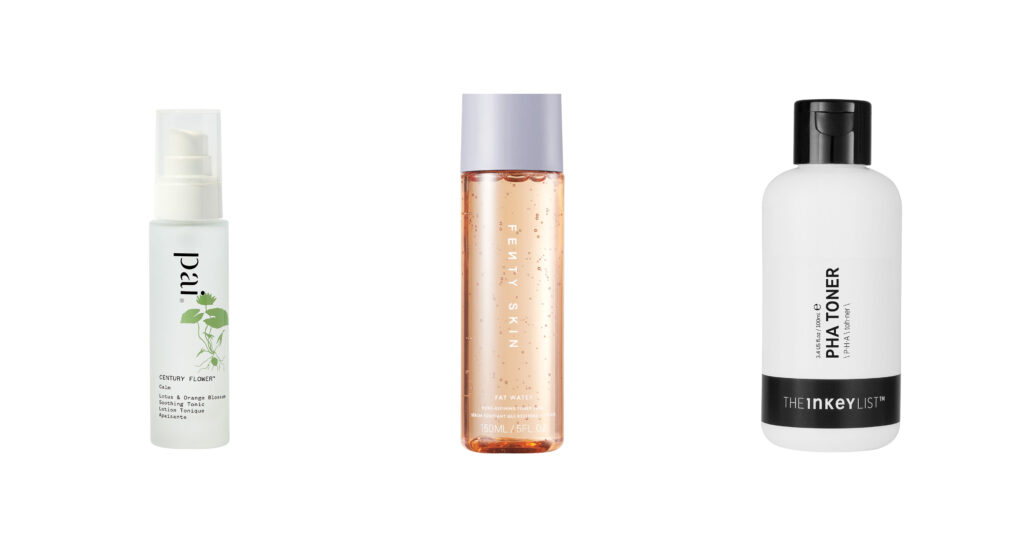
Toners help to prep skin for the rest of your skincare routine and help to bring your skin back to its natural pH level but they can also be incredibly drying if they contain alcohol or other astringents. “As skin tends to be drier in the winter months for many people, reducing the strength of some active agents could be of benefit. For example, switching from a glycolic acid toner to a polyhydroxy acid toner may be kinder to the skin leading to less irritation in those vulnerable.”
Pai Skincare Century Flower, Lotus & Orange Blossom Soothing Tonic is infused with powerful Lotus flower extracts to soothe and calm dry and sensitive skin. Fenty Skin Fat Water Pore-Refining Toner Serum is a 2-in-1 toner-serum combo that improves the look of dark spots and brightens without stripping the skin. The InKEY List PHA Toner is formulated with poly-hydroxy acids to gently exfoliate and gentle aloe leaf juice and niacinamide to nourish skin.
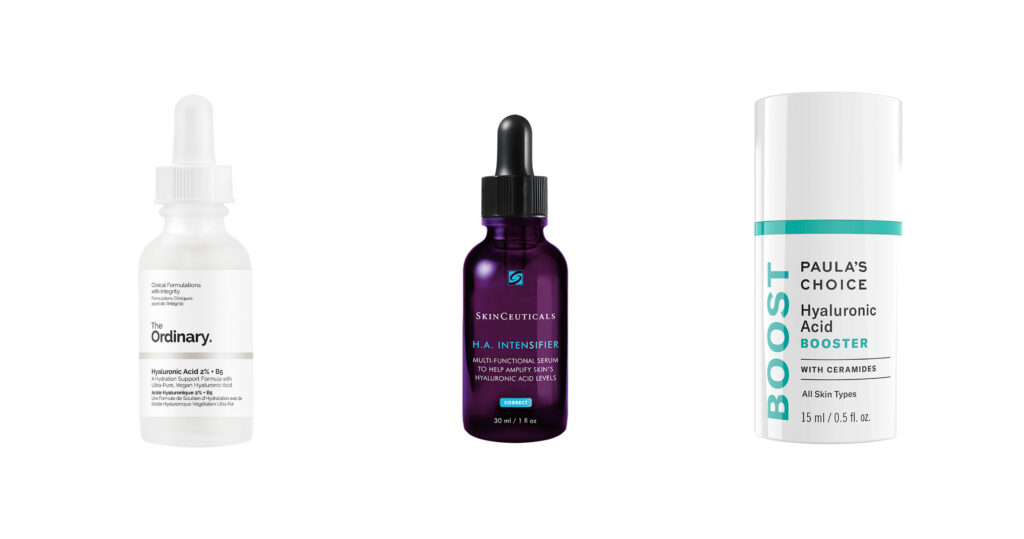
Serums are perfect for dealing with specific concerns. “Adding in hyaluronic acid serums underneath regular moisturisers is also a handy trick in layering skincare to improve hydration levels and skin barrier quality,” says Mahto. The Ordinary’s Hyaluronic Acid 2% + B5 features three types of hyaluronic acid to deliver lasting hydration; Skin Ceuticals H.A. (Hyaluronic Acid) Intensifier is a powerful serum that helps support the skin’s hyaluronic acid levels and improves the appearance of fine lines and skin texture; and Paula’s Choice Hyaluronic Acid Booster is a liquid-gel blended with ceramides to hydrate skin, lock in moisture and boost radiance.

When skin is looking dull and lacklustre your first instinct might be to reach for your exfoliator but whilst your skin is already battling against environmental stressors harsh or over-exfoliation can damage the skin barrier resulting in more skin issues. It’s important to pay close attention to the needs of your skin when deciding which exfoliator to use and how often. “Exfoliation can always help as part of a regular skincare routine and works by removing the upper layer of dead skin cells in the stratum corneum of the skin. Exfoliation can be either physical (e.g. scrubs, mechanical cleansing devices, textured flannels) or chemical (e.g. alpha and beta hydroxy acids). The choice of physical versus chemical exfoliation largely comes down to personal preference – they both have their pros and cons and overuse of both methods will result in irritation or sensitivity of the skin.” warns Mahto.
“With regards to how often one should exfoliate, there is no one size fits all. It depends on a number of factors including the method use, frequency of use, type of chemical ingredient used (i.e. which acid type), formulation (is it a “rinse-off” versus “leave-on product), pH, as well as underlying skin type. The general advice is that if you are using an exfoliating product and your skin is not becoming dry, red, sensitive, irritated or peeling you are probably using it at the right frequency for you; on the other hand, if your skin is showing signs of irritation it is a clear sign you need to back off and reduce what you are doing.
Generally, oily and blemish prone skin can tolerate exfoliation a few times a week whereas as dry, sensitive or mature skin may need this much less frequently and once a week is probably enough. However, it does depend on multiple factors and varies from product to product,” Says Mahto. Superfood Blackcurrant Jelly Exfoliator is an antioxidant-rich facial scrub packed with exfoliating crushed blackcurrants, nordic bilberry and black tea extracts to leave skin feeling smooth, soft and radiant. Then there is Paula’s Choice Skin Perfecting 2% BHA Lotion Exfoliant a lightweight lotion that gets to work dissolving dead skin cells and blackheads whilst softening and hydrating skin. Made with raw cacao powder and rhassoul clay, de Mamiel Brightening Cleanse & Exfoliate is a unique powder-to paste formula that gently exfoliates, and rejuvenates skin without irritating plus it smells like chocolate.
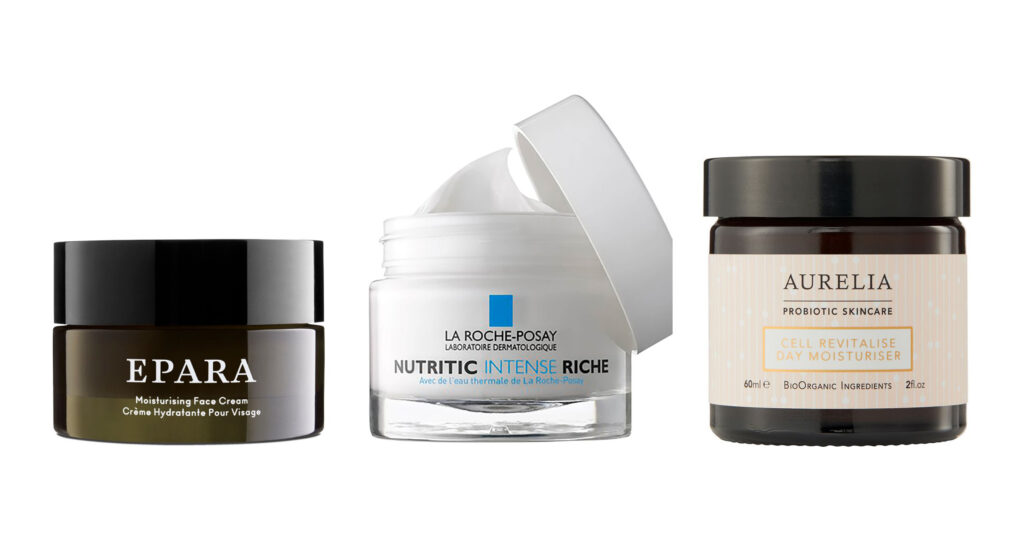
“Winter may be the time to switch to a heavier moisturiser rather than light gels or serums to ensure the skin barrier is protected. Most skin types can benefit from the right type of moisturising agent but this step of a skincare routine is vital for those with dry skin.
Dry skin occurs when normal functioning of the skin is compromised. If the water content in your epidermis falls below 20% for an extended period of time then it will manifest as dry skin – think flaking, scaling, or irritation. The purpose of moisturising is to restore the elasticity and flexibility of the top part of your epidermis (stratum corneum) and restore its barrier function. From an aesthetic point of view, moisturising helps restore the skin’s appearance to make it look soft and supple.
There are three basic categories of ingredients found in moisturisers: humectants, occlusives and emollients. Most moisturisers will contain a combination of these types of ingredients in varying proportions. Choosing the right category of moisturiser is important for your skin. Certain skincare ingredients can have more than one role e.g., glycerin is a humectant and emollient.
Humectants are molecules that attract and bind water from the deeper layers of the skin or environment if ambient humidity is over 80%. Occlusives create a barrier over the skin and prevent water loss from the surface. Emollients work by filling in the gaps between skin cells and replacing skin lipids.
In general terms, choosing an oil-free or “non-comedogenic” moisturiser is beneficial for oily skin types. These types of moisturisers often contain additional actives to target blemish-prone skin such as salicylic acid, niacinamide, and zinc. Whilst the label is not a 100% guarantee that the product will not block pores, it is still better than an agent which does not carry the label.
Using a moisturiser high in occlusive or emollient agents is good for dry skin. Those with very dry skin may want to use a hyaluronic acid serum first layered with a rich, heavy moisturiser on top. Common occlusives found in moisturisers include: dimethicone, squalene, propylene glycol, lecithin, cocoa butter, shea butter, lanolin, petrolatum, paraffin and beeswax. Ingredients which can act as emollients include: dimethicone, trisiloxane, ceramides, linoleic acid, and caprylyl glycol to name a few.”
Powered by a potent cocktail of plankton extract, moringa oil and niacinamide Epara’s Moisturising Face Cream deeply nourishes skin and offers SPF15 protection; La Roche-Posay Nutritic Intense Rich soothes and comforts dry skin with its rich creamy texture making it perfect for cold weather; Aurelia Probiotic Skincare Cell Revitalise Day Moisturiser is infused with probiotic ingredients and plant and flower botanicals like aloe and shea butter to hydrate, protect and balance the skin from the inside out.
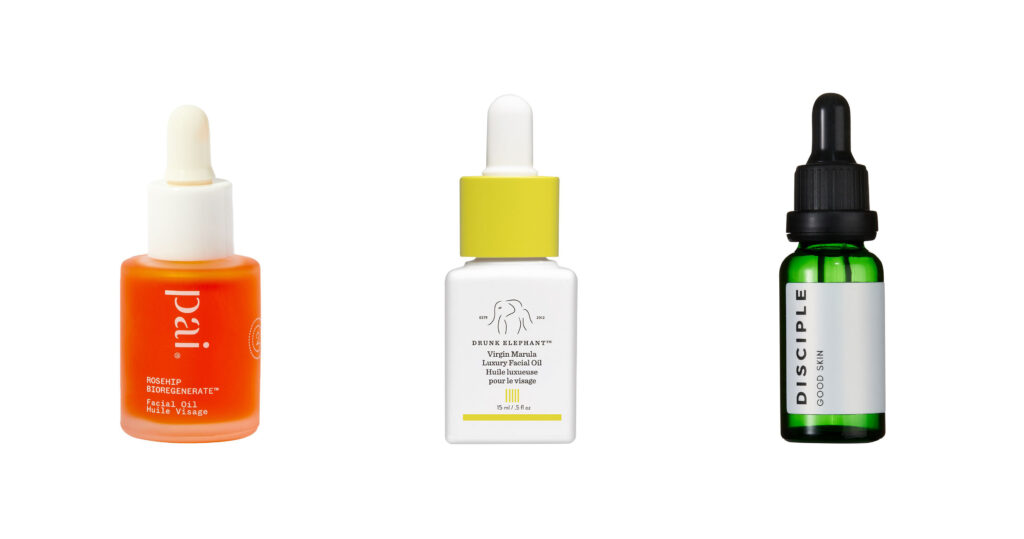
“I am personally not a big fan of face oils as I think they risk blocking pores and the formation of small bumps under the skin known as comedones. However, if one has dry, very dry or post-menopausal skin then face oils could be an option. Ingredients to look out for include vitamin E, oleic acid, almond and moringa – these can help prevent water loss from the skin surface,” says Mahto. Pai Skincare Rosehip Bioregenerate, Rosehip Seed & Fruit Universal Face Oil is great for distressed, sensitive skin thanks to the powerful healing and regenerative properties of rosehip oil, it’s also packed with antioxidants to help protect skin against environmental stressors. Rich in vitamin E and omegas 6 and 9, Drunk Elephant’s Marula Oil Virgin Marula Luxury Facial Oil is a nutrient-dense oil that helps to nourish and feed skin what it needs. If you’re prone to break-outs then Disciple’s Good Skin Face Oil might be the oil for you. Formulated with grapeseed oil to help improve skin elasticity, turmeric oil to aid the healing process and prebiotic burdock root to fight the bad bacteria responsible for break-outs and inflammation.
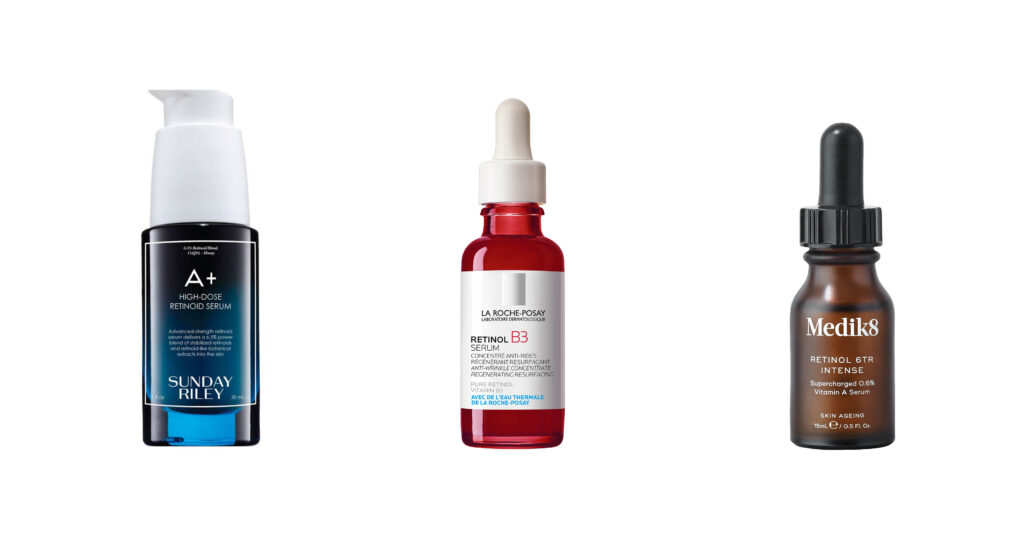
“Winter is a good time of year to incorporate Vitamin A containing products into your skincare routine or consider a course of chemical peels for the skin. There is little ultraviolet radiation around in northern Europe during this time so the risk of burning or pigmentation is low,” explains Mahto. But she warns – “Skin of colour often suffers with issues of hyperpigmentation. If this is the case, then ensure you are wearing a sunscreen containing iron oxide if you are going outdoors throughout the year – winter included.” Try Sunday Riley’s A+ High-Dose Retinoid Serum a supercharged retinoid serum that delivers a 6.5% solution of stabilised retinoid blends into the skin for a more even-toned and radiant complexion. For budget friendly options there is La Roche-Posay Retinol B3 Serum a unique formulation which is ideal for sensitive skin; and Medik8 Retinol 3TR Intense a serum that uses time-release technology to help minimise irritation whilst promoting a more youthful complexion.

To combat dryness and dehydration a nutrient rich mask is the perfect remedy. “For those suffering with irritated, dry winter skin, using a hydrating face mask will temporarily boost moisturise levels in the skin. Look for masks containing ceramides and hyaluronic acid,” always check the ingredients list advises Mahto. “If your skin is red, peeling or flaking then avoid anything with essential oils or fragrances which may irritate it further.” For intense hydration Ameliorate Restorative Facial Mask is charged with hyaluronic acid and ceramides and promises to reveal skin that is more plump, supple and radiant looking in the morning; Dr.Jart+ Dermask Hydration Lover Rubber Mask is packed with vitamin C, green seaweed extract, an intensely hydrating mask that quenches thirsty skin and supports skin’s natural collagen synthesis. Eve Lom Moisture Mask is the perfect remedy for dehydrated skin. Its advanced moisture complex gives skin an intense boost of hydration, helping to restore skin’s moisture balance, whilst the vitamin E works to protect your newly hydrated skin from environment stress..

“Winter is usually the busiest time of year for me in the clinic to be treating issues of pigmentation, ageing or scarring. Treatments like chemical peels and laser are best carried out at this time of year (I always recommend October to March) as there is little sunlight around and the skin is less vulnerable to complications such as pigmentation or burning after these types of treatment”.

“Invest in a good quality lip balm as lips can become dry or chapped (lips have little to no oil producing glands and are therefore particular vulnerable to drying out). Use emollient-based shower gels or body washes and make sure you moisturise the body top to toe after your bath or shower. If your skin is dry or sensitive then avoid fragrance-free moisturisers or bubble baths,” explains Mahto.
Skincare like most things is personal and changeable. “Learn what your skin needs, your skincare routine does not have to be the same every single day. Some days it may need a bit of extra moisture so layer the hyaluronic acid; other days it may not feel dry or tight after cleansing and you can skip this step. Don’t feel the need to layer multiple products into your morning and evening routine as this is more likely to irritate the skin and may even lead to rashes such as eczema,” says Mahto.
Coconut, olive and grapeseed oil are just 3 of the 7 natural oils found in Glossier’s Body Hero Daily Oil Wash. This oil turns foamy when mixed with water and leaves your body feeling clean without drying out your skin. 79 Lux Body Balm is bottled in black violet bio-photonic glass to protect its precious ingredients. This potent balm is enriched with essential oils, shea butter, hyaluronic Acid, Lactic Acid and Zinc everything you need to revive dry, dull skin. Transform dry, chapped lips with Weleda Skin Food Lip Balm. Its soothing lightweight formula helps to protect lips from harsh environmental factors like cold winter weather and moisture-sucking central heating.
Follow @anjalimahto and @skin55limited
We've got great things to share!
Sign up for our weekly newsletter
and we'll keep you updated.
You can unsubscribe at any time
Terms & Privacy